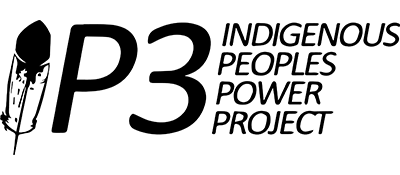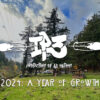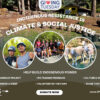|
Getting your Trinity Audio player ready...
|
On the latest episode of Skoden Talks With The Homies, Indigenous Peoples Power Project is honored to share space with Courtney Peyketewa, to hear her story as a member of the Indigenous Milk Medicine Collective, and as the Coordinator of Diversity and Outreach at Rose State College. Courtney Peyketewa is an enrolled member of the Seminole Nation of Oklahoma, Tusekia Harjo band, katcv (Tiger) clan and is a descendent of Creek, Euchee and Zuni Pueblo people. She is a mother and currently resides in the Oklahoma City metropolitan area (Edmond) with her fiancé Isaiah and two daughters Carmen (7) and Camille (1). As a member of the Indigenous Milk Medicine Collective, Courtney is breast/chestfeeding advocate and community lactivist who is supportive of causes that raise awareness about breast/chestfeeding topics and issues and the need for support circles and resources for mothers and caregivers throughout the milk journey experience. In her role as Coordinator of Diversity and Outreach at Rose State College, she facilitates Indigenous events on campus, and helps recruit and retain Indigenous students on their path of higher education.
Aside from all her work supporting Indigenous students and mothers, she is most passionate about being a mother to her two daughters, and considers her work as a breastfeeding advocate, and helping people in education as tied together. On her path to becoming an advocate for breastfeeding and education, she started her journey as an undergrad at the University of Central Oklahoma in 2009 working on her education degree. She was involved in many organizations where her drive was creating action on campus, and was involved in the Native American Student Association. She went on to graduate with her Bachelor’s of Science in Physical Education where her goal was to be a teacher while having a physically active lifestyle. Around the time of her graduation ceremony, she was excited to learn that she was pregnant with her first child, Carmen, and wanted to be at home with her new baby as long as she could. In that first year at home with her family, she wondered how she could get back into her education and career. When speaking to her advisors upon her return to higher education, she was encouraged to use those experiences as the foundation of her career, and went on to earn a Master’s degree in Adult Higher Education from her alma mater, UCO while working in the office of Diversity and Inclusion. In that role she helped with programming, coordinating events with a focus on Native American graduation retention, and building the Native American Success Initiative which remains a program to this day. She explains that she was excited to see that program grow from a seed to a now thriving program at UCO.
Some of the programming offered to Indigenous students at Rose State College are a four year experience at a two year college, on campus housing, a food pantry for students experiencing food insecurities in partnership with the Regional Food Bank of Oklahoma, and a community clothing closet where students have access to a professional wardrobe at no cost help prepare them for the professional world. They have an American Indian Association Club on campus that plans campus events for Indigenous students, providing an intentional space for students to belong, and that encourages other Indigenous students to get involved. They also have a Native American studies program where students can earn an Associates degree, they host a summer camp called Oklahoma Future Native Leaders where Indigenous students get to experience campus life and academia, and where cultural arts are shared among community and prospective students. With all of the programs available, Indigenous students are better able to see a clear path in their education and professional pursuits, and a path forward to accomplish Bachelor’s and even Master’s degrees.
When asked of her experience with the Indigenous Milk Medicine Collective, she recalls her experience as a first time mother and early friendship with Jasha Lyons Echo-Hawk, founder of Native Breastfeeding Week, who approached her with the idea of wanting to create a support system for Indigenous mothers working to decolonize breast/chestfeeding, and to create an intentional space for support. What started as Native Breastfeeding Week would later become Indigenous Milk Medicine Collective, a grassroots organization of Native women, two-spirit, and femme lactation providers, lactivists and supporters working to increase the resources for Native first foods experiences, to promote healing and wellness, and to push for access, opportunity, visibility and equity in Indigenous Milk experiences. They host an annual week long event for National Breastfeeding Awareness Month, where they highlight Indigenous Milk Medicine, hosting a variety of virtual events and experiences for others supporting Native mothers, caregivers and providers. The work includes decolonizing feeding practices in the mainstream, upholding food sovereignty and traditional kinship for next generations.
As a symptom of colonialism, most mothers have experienced being in spaces where traditional feeding practices; breast/chestfeeding is considered inappropriate, and when asked what a lactivist is, she describes the process of lactation and activism, supporting caregivers and mothers in traditional feeding practices. In traditional ways, breast/chestfeeding was a normal part of every day life, and through colonization many mothers have opted out of breastfeeding because they didn’t have support or were made to feel shame in colonial society. For mothers looking to reconnect with traditional feeding practices, Indigenous Milk Medicine Collective is there to support them. The organization works to create support systems and networks, and provides information on how mothers can reconnect with traditional feeding practices. If you are need of support, or would like to support the Indigenous Milk Medicine Collective, please visit www.indigenousmilkmedicinecollective.org, or follow them on Facebook/Instagram at Indigenous Milk Medicine Collective. The group is accepting of all people who support traditional feeding practices, and is inclusive of all those who support the mission. Please like, share, and subscribe to Indigenous Milk Medicine Week Collective, and stay connected to all the great work this organization is doing! Thank you, Courtney for your time with us, and for your work in uplifting and empowering Indigenous communities! We wish you all the success in your work and future endeavors.
Blessings,
The IP3 Action Team
NOTE: You can watch the full interview here or on the Indigenous Peoples Power Project YouTube Channel. If you know of a person doing great work in our communities, and would like to nominate them for an interview on Skoden Talks With The Homies, feel free to contact us anytime at info@ip3action.org!









